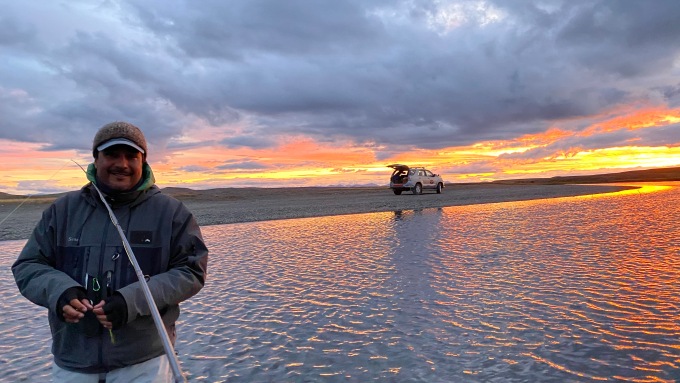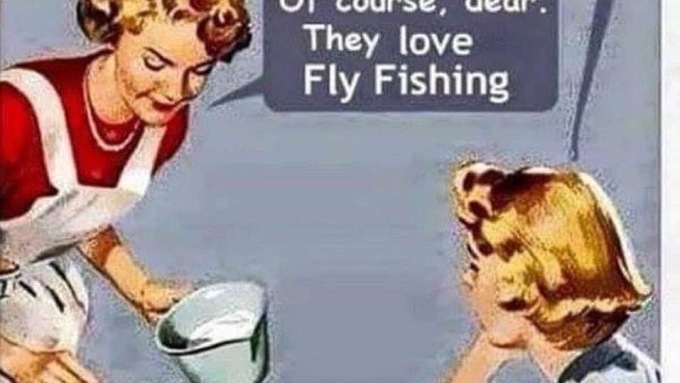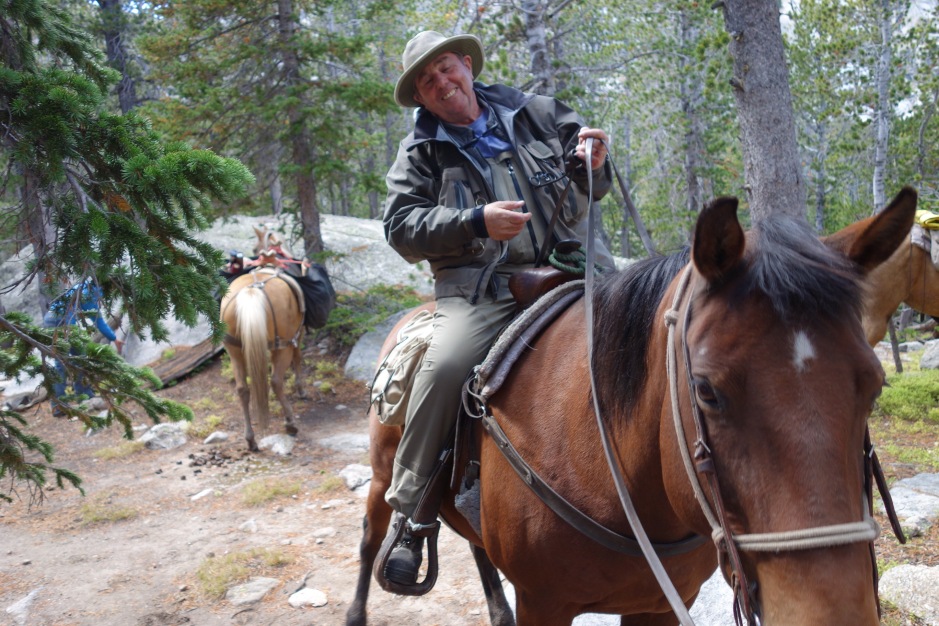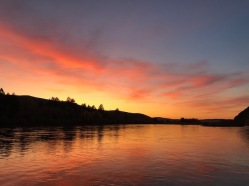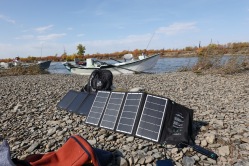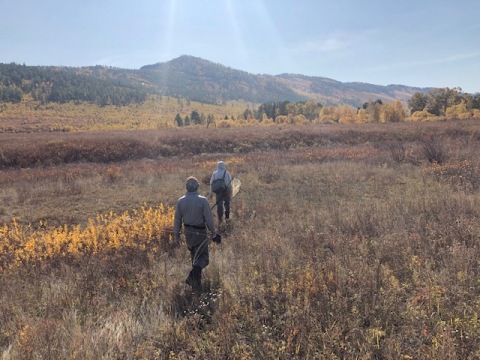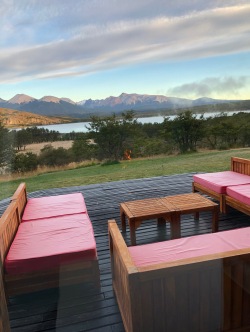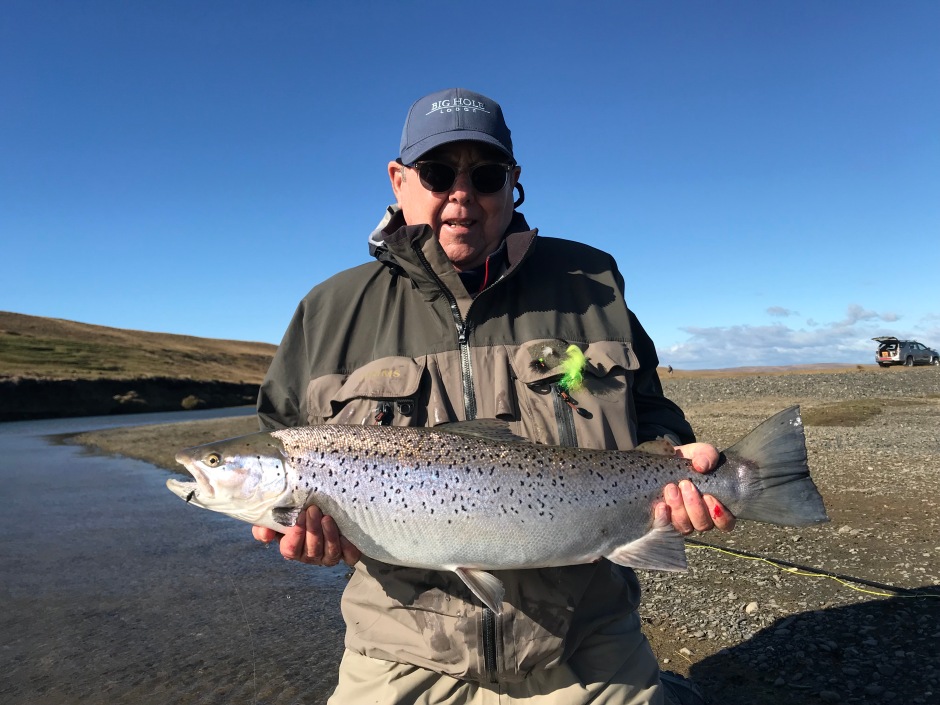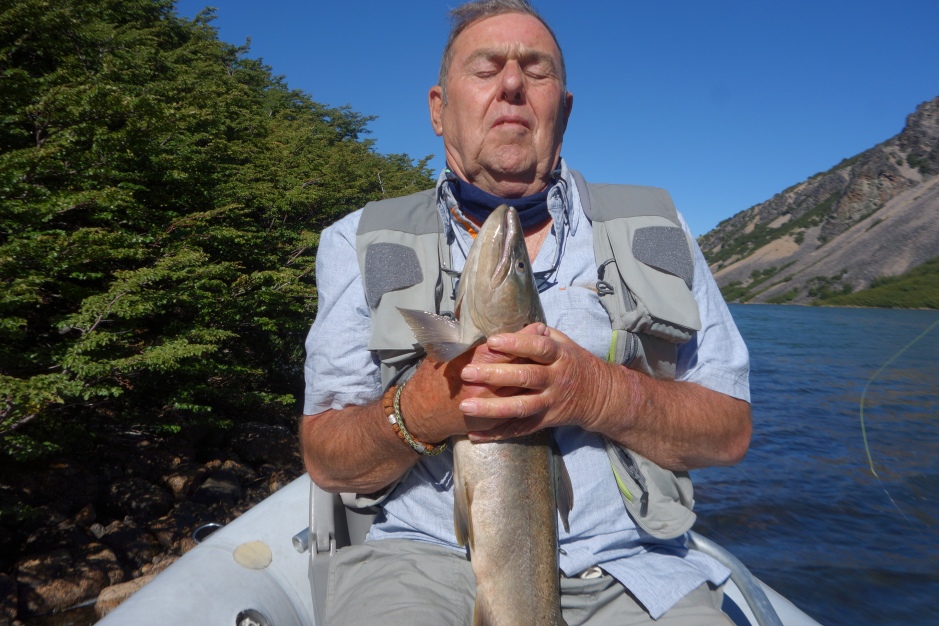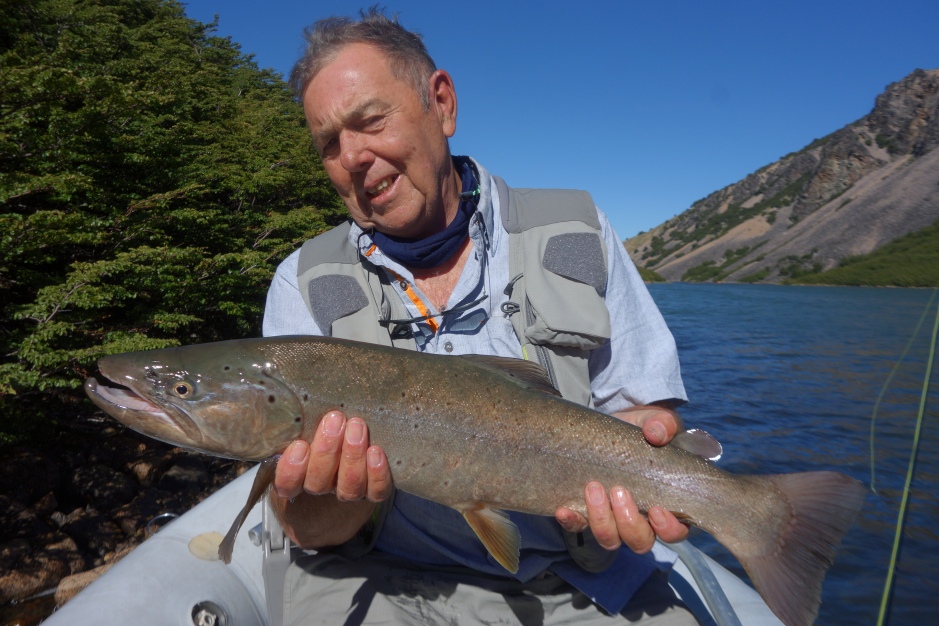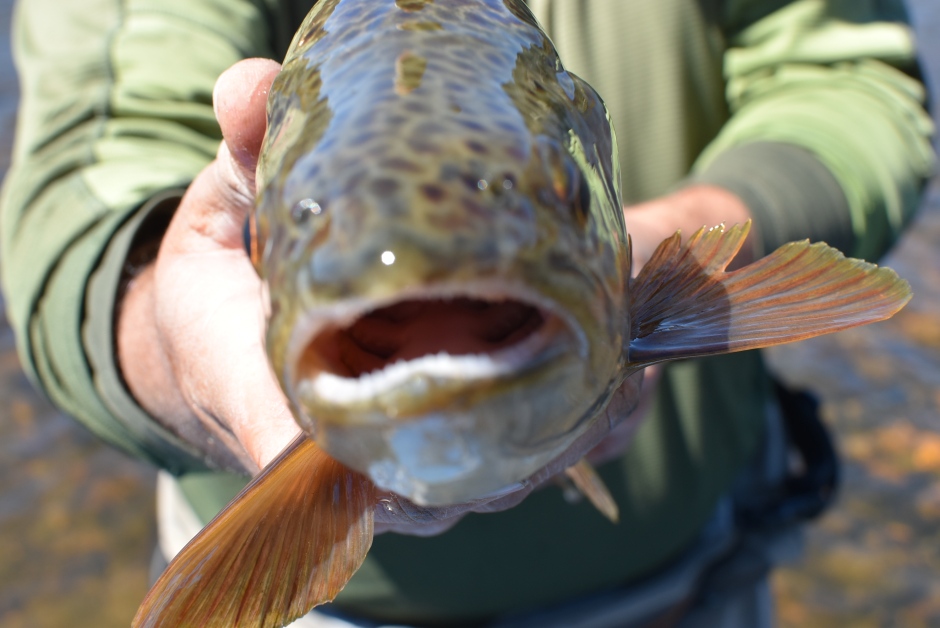My chances to fish are so infrequent because of work and long periods living in the Middle East, that a lengthy stay at home in Ireland risked turning into a raging binge-till-you-blackout angling rave.… More
IT’S NOT OVER UNTIL THE LAST MINUTE

My son Lewis swears he never said it as we drove to the airport in 1990s Cyprus to return him and his sister to their home in England. But I distinctly heard him tell himself: “It’s not over until the last minute.” It had been a super, sunny break, and they were leaving while I continued as a journalist in the Middle East. I felt for him. The holiday event was, indeed, at an end but the underlying love that enriched it would continue, and there was the next reunion to plot and plan. I do not think I convinced him.
BRANDY AFTER BREAKFAST
If you’ve seen City Slickers and/or smuggled excess Duty Free through airport customs, then you’ll have some idea of how I felt as I drove from Jackson towards Lander to drive up to Jim and Mary Allen’s Diamond 4 Ranch in the Wind River Range. City Slickers shows what happens when aging men raised on TV westerns go to a “Dude” ranch. Embarrassment. And if you’ve ever been caught trying to get more than your allowance through Customs, then you’ll know what I mean. Shame. Humiliation. Cringe.
The road up to the ranch left the world of metaled roads and sell-everything gas stations behind, winding into the 2,800 square miles of mountains that make up the Wind River Range. My instructions from the website were immaculate. Just as well. Google maps, the Internet, electricity and phone signals stopped about an hour up the track. Continue reading “BRANDY AFTER BREAKFAST”
TROUT FISHING IN MONGOLIA, WITH A COMB
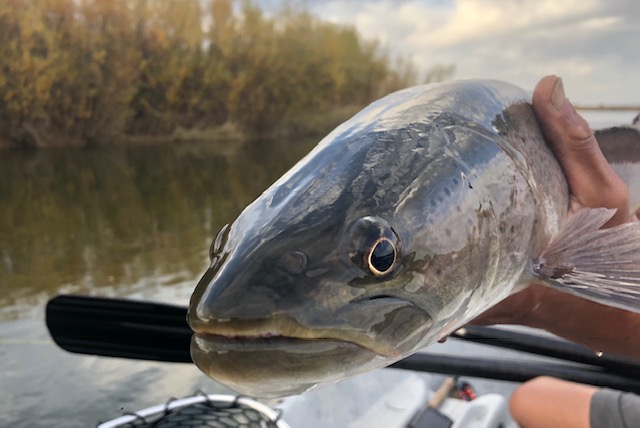
“You are fishing where?” asked an incredulous friend. “What on earth for?” It was a typical remark. Even from some fishing friends. And there were, as always, two answers.
- Wild fish don’t live in ugliness. They live in beautiful places. I want to see more beauty in my dwindling days.
- Taimen, a landlocked salmon, are found in Mongolia and parts of Russia. It’s a fierce and aggressive creature and lives by eating other fish. There are also Pike, the Amur trout and the Lenok, a local fish, all of which will come (or not) to a fly.
The idea to fish Mongolia came from a friend and guide, Marcelo Poo, who I met in Chile at the Estancia de los Rios (https://www.estanciadelosrios.com/videos) in Chilean Patagonia a couple of years back. He guides in Mongolia for Mongolia River Outfitters (MRO) when he’s not working in Chile. He said it was even more wild than Patagonia. So I flew to Ulan Bator and landed at Chingis Khan airport. That’s how Mongolians pronounce the name of the great Mongol marauder, with a Ch where others use a G. I got there via Istanbul but South Korea is also a useful hub for flights in. What greeted me was a fairly typical post-Soviet city of featureless apartment blocks interspersed with advertisements for all the usual globalisation bling (BMW, Samsung, Rolex, Johnny Walker, etc) that have accompanied shucking off Chinese rule in 1921 with Soviet help and then walking away from Soviet influence in the 1990s.
Chingis Khan might have been horrified to see what his name has been attached to. Restaurants, souvenir shops, bars. But the Grand Khaan Irish pub does a nice line in Mongolian dumplings, soups and grills as well as the usual burgernchips. The people could have been in any European city, apart from a few wearing the traditional Mongolian calf-length tunic or Deel, the bright colours reminding you that China is to the South. Then there are the grid-like streets and imposing official buildings, reminding you that Russia is to the North. But the temples, especially the Bogd Khan palace, a vast old temple in the city centre – Ulan Bator means Red Hero after the Buddhists’ red robes – say you are in Mongolia.
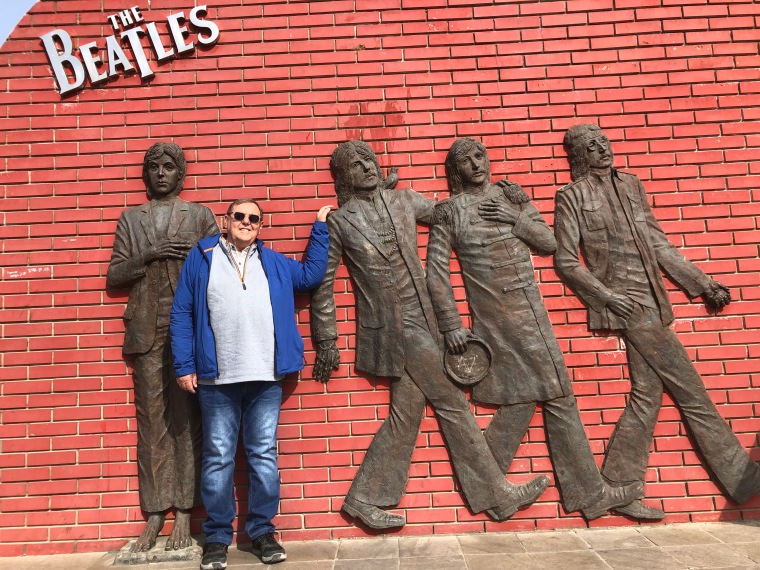 And the Beatles statue. When Mongolia was in Soviet Russia’s orbit, the Beatles were revolutionary music and frowned upon. Now that Mongolia is fully independent, the Fab Four statue is a go-to place on a little city centre square on which sits, helpfully, a fairly well-stocked fishing tackle shop. It’s a popular place for wedding photos.
And the Beatles statue. When Mongolia was in Soviet Russia’s orbit, the Beatles were revolutionary music and frowned upon. Now that Mongolia is fully independent, the Fab Four statue is a go-to place on a little city centre square on which sits, helpfully, a fairly well-stocked fishing tackle shop. It’s a popular place for wedding photos.
I was the only fisherman on our small aircraft flying north to the Onon river. All the other passengers worked for MRO. A bumpy drive later and we were by the river, which Marcelo had warned me was uncommonly high, which is not good for fishing anything. There I teamed up with anglers who had already fished the upper stretch of the river for a week. They were somewhat disconsolate about the lack of Taimen so far but were promised the next few days would change their luck. I got into waders and jacket and boarded Marcelo’s boat to drift downstream. He warned me that when you hook a Taimen you don’t lift your rod tip, which you do for fishing trout. Instead you “strip strike”, which means maintaining the rod low and pulling the line sharply several times to try to embed the hook in the fish’s rock-hard mouth. The water was coloured and high and not encouraging. The other anglers disappeared into the distance while the “camp followers”, staff in inflatable boats, took the entire camp, tent, shower, toilets, kitchen and everything else, down to our next camp site several hours downstream. This happened every day. One minute you’d be eating scrambled eggs in the restaurant tent and the next minute it would be on an inflatable piled high with bags floating downstream. It was a bit Lewis and Clark or maybe Livingstone, but it was efficient, ran like railways used to and made sure there was a dry bed and warm food and company every night. Easy to take for granted when you are not the one digging the next latrine or preparing dinner for eight on an open fire.
Within minutes Marcelo and I were alone on a broad sweep of river flanked by canyons on one side and plains on the other. Half Montana, half Wyoming, all Mongolia, the most sparsely populated country in the world but the 18th largest, with a population of three million. In a week I saw three other people and one car. The fly Marcelo gave me was heavy, to sink in the high water, and garish. It resembled a road-killed Peacock and was as easy to cast as a piano stool. Accustomed to casting more genteel creations, my shoulders began to ache, and we switched to a popper or gurgler. These are also extravagant creations which float on the surface and make a lot of splash and noise on retrieval; this annoys the aggressive Taimen no end. We tried a lot of likely spots and made a great deal of surface noise but nothing moved. I was about to suggest we change back to a weighted chicken when a Taimen zipped into the air like a missile with my gurgler in its teeth. I stripped, I struck, several times. And it stayed on long enough to be netted. It was just a small one, maybe 18 inches. But when Marcelo opened its jaws the fly just popped out. It wasn’t even hooked.
I learned the lesson very quickly. Taimen make playground bullies with stolen footballs seem positively meek and mild. For them possession is 9.5 tenths of the law. Often they will not open their mouths when “hooked” because they don’t want to give up what they have taken. In the strictest sense of the word, MANY are not hooked at all.
Other boats and anglers drifted by as this happened. “Fish on your first day huh?” said one American voice. “Nobody is gonna talk to you this week. I hope you know that.” He was joking. The nightly banter around the dinner table as well as serious discussion of the habitat was an unforgettable feature.

In my experience a first day fish is never a good thing. It encourages the feeling that every day will bring more of the same rewards. Unless you’ve caught a first day fish and been skunked for the rest of the week, which was my Mongolian experience in a nutshell. I connected with many more, including big ones, but just couldn’t get them to the boat. Which didn’t upset me at all. That evening, in the company of six other anglers, we swapped notes and few were taking fish at all. Over a week it seemed that one boat would catch several and others nothing. The pictures I include here are of the lucky anglers who did. It was a total camping adventure, although the food and accommodation tended towards the glamping side. There was no electricity, no mobile phone coverage, no Internet. Just the sounds of water moving through wilderness. To keep camera batteries charged, I bought a solar panel with me and the only lighting in our tents was from solar-powered lamps that had fired up on boats during the day.
And they were great people. The banter was hard-edged but benign. We spent our evenings in the restaurant tent eating good food, imported vegetables and local treats. Then it would be a brisk walk in freezing temperatures back to the tent and under the many blankets as fast as possible and deep sleep. The morning light woke me up but what ultimately made me shed my blankets was the daily arrival of Tukol, a diminutive Mongolian mother of three who brought us all fresh coffee, a piece of Snickers/Marathon and a biscuit every morning. She would stoop inside the tent door, deposit a cup of coffee and a plate of goodies and say, “you are welcome” when thanked. Every day.
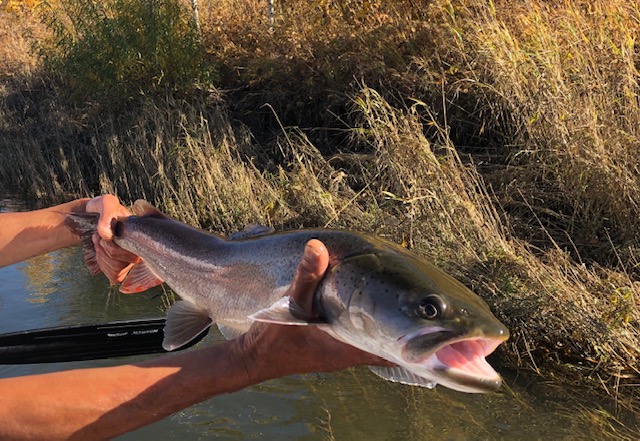
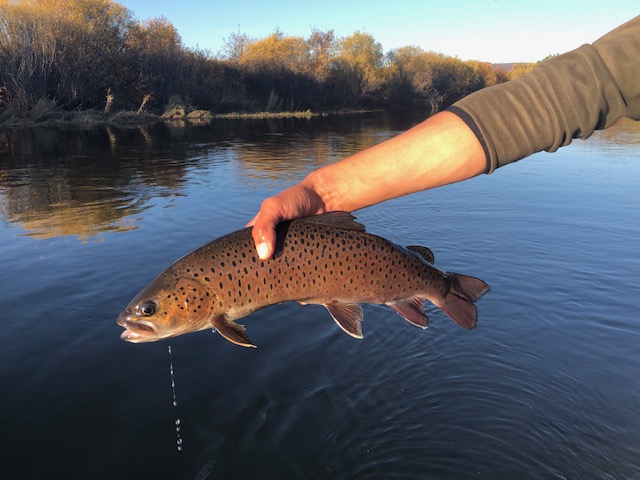
After breakfast it would be back to the boats to drift downstream while the camp was packed, except for the lunch raft, which set up a barbecue and table half way down the river so we could eat pork chops with fresh apples and sautéed potatoes bankside. In all we drifted about 100 miles downstream to the last campsite, which was a permanent fixture and lodged us in traditional Mongolian Gers, round huts made of felt and decorated on the inside the Mongolian way.
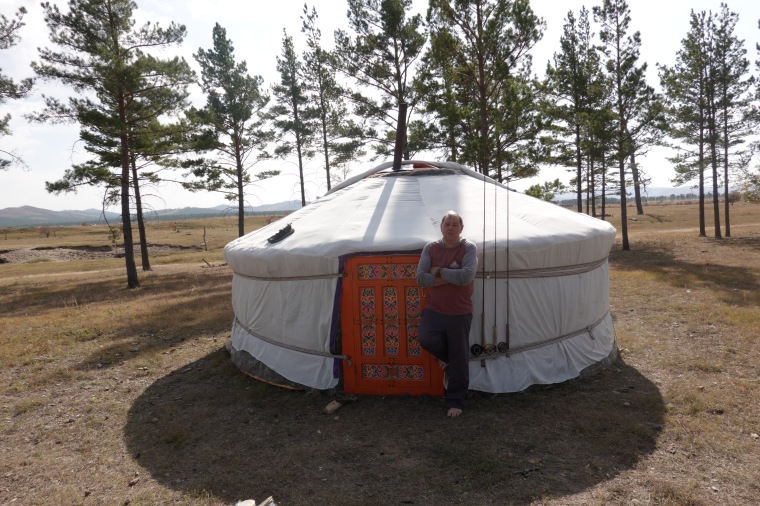
The days were hot, sometimes very hot, and the fishing was hard. In one spot off the main river, head guide Peter Fong said bluntly: “I know the Taimen are here.” I cast. A Taimen grabbed my fly, leaped in the air and was gone. Then another did the same thing, then another. Meanwhile my partner in the boat, Merrill, landed two big ones. So goes fishing. They say Taimen are the fish of a thousand casts. I think that may underestimate it a bit. If Taimen are the bully boys of the river, then Pike are the outright thugs. I caught one by mistake but it was a thrilling error. All my fishing life guides have told me “keep pulling him back, your rod can take it.” Until Jack, my guide, that day said, “whoah, let out a bit of line or you will snap the rod.” It was then I noticed it had gone U-shaped under a battling Pike.
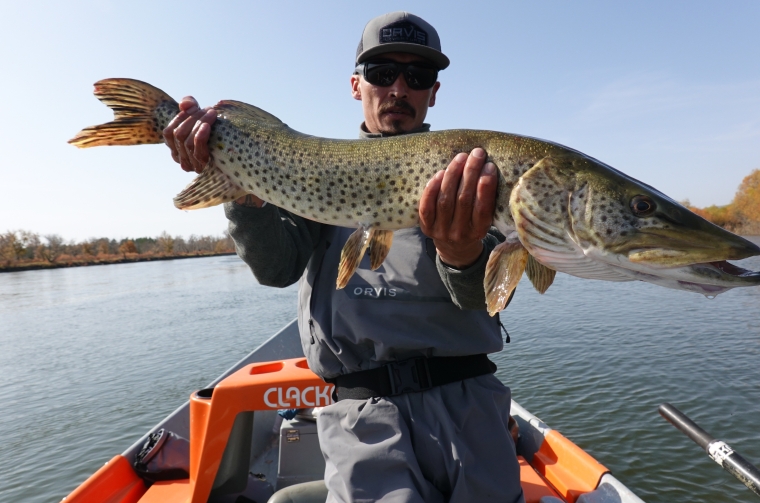
On the last day Jack and I were alone in the boat and fished for Pike exclusively, looking for slack water where the fish would like to ambush prey. He tied on a wire trace against the toothsome greeting of a pike, and lures that resembled small fish.
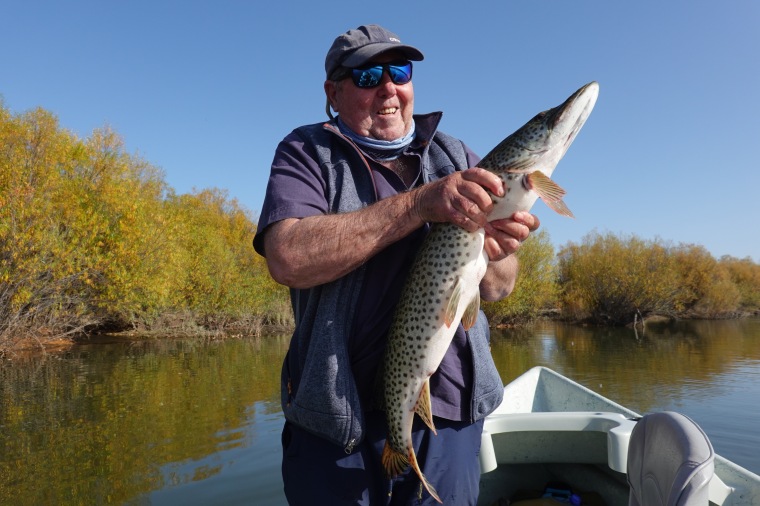
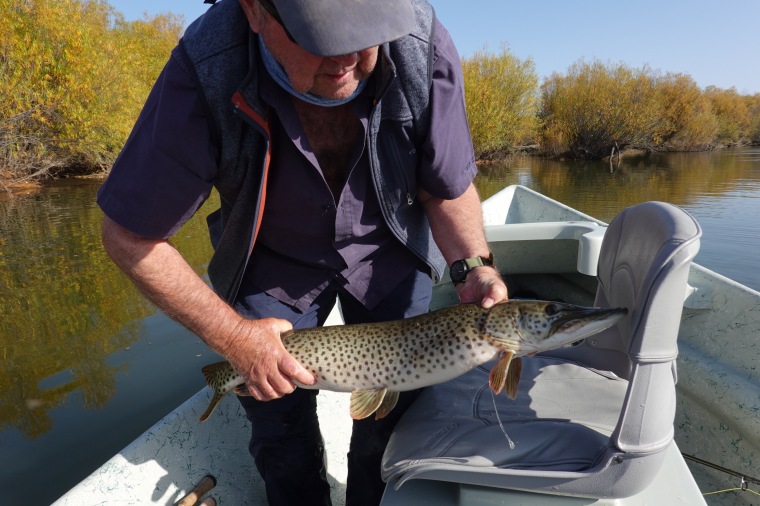
My notebook is not clear how many we caught but they were many, all of them around an arm’s length or more and as savage as gut-shot bears. One took the hook so deep that we had to wedge its jaws open with the sunscreen bottle. Putting your hand inside a Pike’s mouth is not unlike putting it in a rat trap. Their teeth would make Hells Angels quiver.. But every day was a wilderness adventure, and every evening was camp geniality and fun. Most of the talking was about fishing far places and the experiences we had had. One day head guide Peter Fong told us that in his peripatetic family there is a rule. If you kill it, you have to eat it. This, apparently, extended to a rattlesnake his son had found and killed. And yes, they do apparently taste “a bit like chicken.”
My memories will be of the Taimen and Pike “take,” which is like a door slamming in your face; and of one particular evening when Merrill, an amiable and witty Pilot in Chesapeake bay, told us of how he had tried to pick up a few Mongolian phrases to converse with local people. He had tried out Sem banna uu? (how are you?) on a Mongolian on a motorbike whom he encountered on the bank. “The guy looked at me as if I was crazy, sped up and disappeared,” Merril recounted.
“Do you realise what you said?” asked Tsozo, another Mongolian guide. “You asked him: “Can I borrow a comb? What you meant to say was saIn baina uu. That’s the phrase for how are you?” The laughter lasted a long time. The memories will last for ever. Thanks to MRO and everyone in the group and in the camp. It was unforgettable.
FISHING IN PATAGONIA WITH EINSTEIN AND THE DALAI LAMA
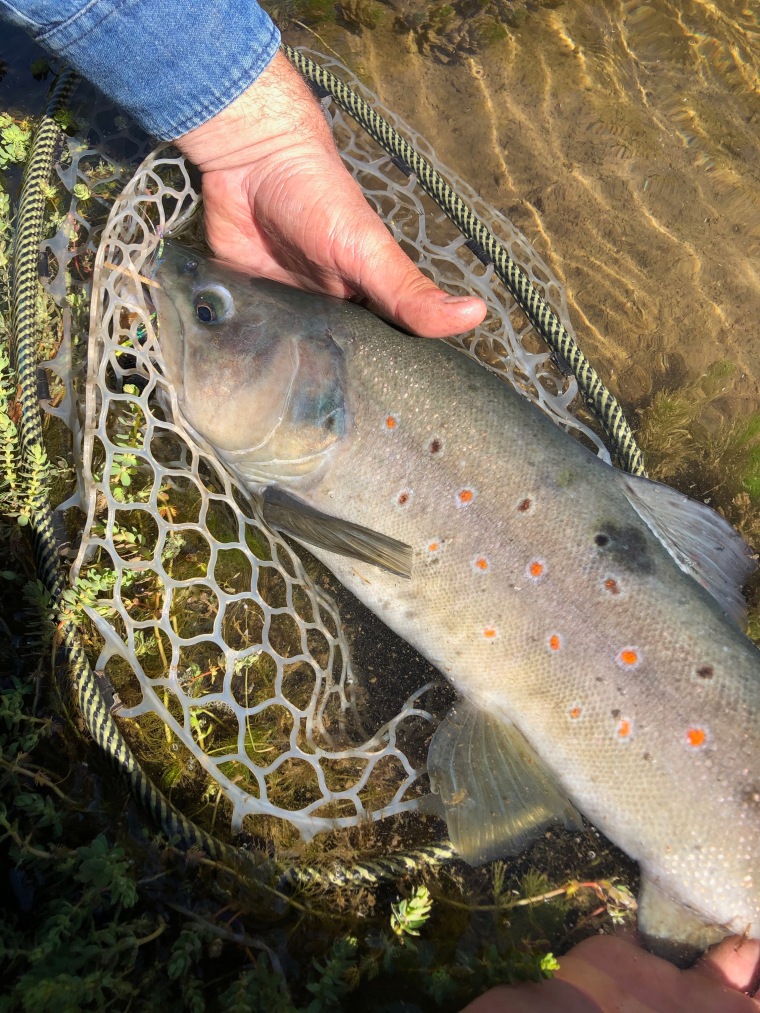
I walked into the Lodge, a beautiful wooden structure planted on a slope overlooking a luscious lake and jagged, snowy peaks beyond. Every seat, nook and table had been placed so that guests could drink in the Patagonian landscape and breathe its intoxicating air. The windows were tall and wide, the 180-degree view from them breath-taking, in the proper sense of the phrase. After 10 days in Tierra del Fuego’s barren Patagonian wastes, this new landscape in Argentina had a soothing, sedative kind of beauty. The Kau Taupen wilderness had forced me to tighten every physical and metaphysical nerve against the raw wildness of the ever-present wind.
But the beauty of the Tres Valles lodge had the opposite effect, of unbuttoning defences, opening up, breathing in as if airing the soul after a winter’s confinement. I had chosen it as an antidote to my sortie into Tierra del Fuego in search of giant Sea Trout. And also, because it seemed to offer regular fly fishing for trout, in which I am much more versed. A part of me saw it as compensation in case I blanked at Kau Taupen. I didn’t.
So, my first thought as I looked over the lake after a three-hour drive from Esquel airport was akin to that feeling you got on birthdays or Christmas when gift-wrapped surprises tumble into your lap, a veritable embarrassment of riches. Is this all for me? And for the dozens of baseball-capped anglers in cargo pants and rain jackets who jostled with me at the carousel for their rod tubes? Not one of them had come to Tres Valles. They had all been absorbed by other lodges, other captivating landscapes. I was alone.
IS ANYBODY HOME?
Once my bags had been dropped in my vast bedroom, I hunted around for other guests. There weren’t any, it seemed. There was nobody at home apart from some friendly kitchen staff with even less English than my Spanish. But I did manage to work out that the other six people staying there were from France, including the owner a French businessman. So I settled in on the veranda, and drank in the view while reading the Guests’ book, which was exhilarating. So many people, so many fish, so much joy.
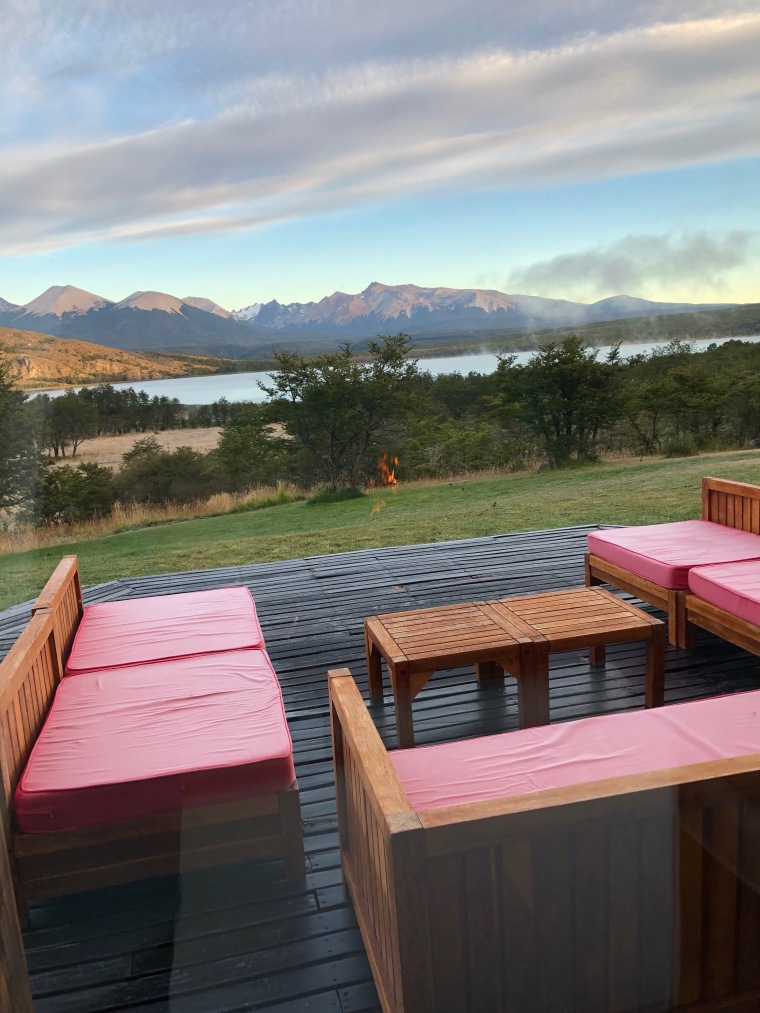
As the sun began to set the others began to return. Bruno, the owner, his wife and small son and three other fishermen from France. We fenced around in English for a few minutes and then slipped into French, which was to become our language for an entire sociable week. I’ve never been sure of the real perceptions the two nations hold of each other. The French call the Brits les rosbifs and the Brits call the French the frogs. But I had studied French at university and have an on-off love affair with France, and once our national guards slipped, the conversation flowed easily around the fire, dinner table and veranda.
It was greatly assisted when I identified as a Brit who does not believe in Brexit. Bugger Brexit and Bugger Boris do not translate exactly into French, but it wasn’t necessary. Around the table the collective dismay at Britain’s capacity for self-harm washed over any well-chosen phrase I could utter. We were as united in our horror as we were galvanised by our love of fishing, and the fishing, they all said, was pretty good. The rivers were low but the climate stable, they said. Even a rosbif might get a few. We fenced about rugby, which both countries love; about food, which both countries love; and about trout fishing. One of men at the table regularly fished the same French waters that the legendary Charles Ritz did in the 1930s. A great deal united us in convivial enjoyment. Very little separated us.
WATER, WATER EVERYWHERE
I awoke in a vast bed with my curtains open on a slice of landscape that resembled views in Switzerland, Rwanda and Scotland. Hills rolled and I knew there would be streams in the folds between; clouds played peek-a-boo with mountain tops; the lodge lawn sloped gently to a vast lake. At the edges, there was the occasional dimple from a rising trout.
Dinner had been a common sizing-up, as happens at any fishing lodge around the first drink or meal. And we had found commonality in a love of landscape and fishing, and the ease that comes with being settled in, and at the mercy of, nature all around us. We were different heights, girths, ages and nationalities, but we were happy to be together in this place, each one at ease with its boundless beauty and possibilities.
The first day with a fishing guide is much the same, probing each other for common and uncommon areas. Miguel, my guide for the week, talked to me as we drove about the Rio Pisco system and what it had to offer. We settled on our first outing on a small river with occasional pools and drove up and down well-worn tracks, each peak offering a new people-free landscape, each trough offering glimpses of streams and creeks. It was nearly too much. There was a moment, on that first day, when I would have settled for a picnic on a hillside to gaze around at all the vast greenery and shimmering water.
But I doubt Miguel would have settled for that. He was (and is) an avid, addicted fisherman. While I was seeing paradise at every turn of the track, he was seeing fishing possibilities. One of the beauties of central Patagonia in Argentina and in Chile is the sheer abundance of fishable water. Lakes, wide rivers, small rivers, rocky streams, spring creeks, and even ditches, they all hold trout which have thrived since their introduction 50 or more years ago. Miguel gave me a bewildering choice on my first day. I opted for a river an hour’s drive away. “It’s low, but there are good pools,” he promised.
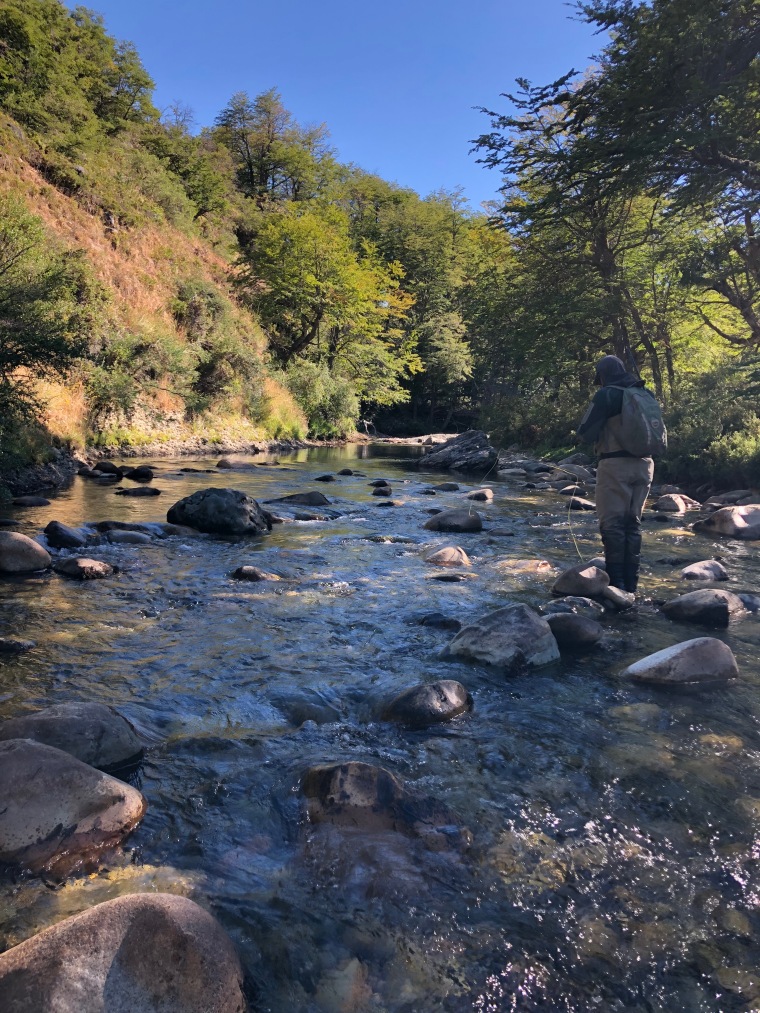
And so it was. Low with good pools. We scrambled down a rocky hillside to a narrow river showing its bones. No fish were rising. We put a small nymph on my five-weight and walked upstream. I caught a couple of small fish on the way but, more importantly, seemed to satisfy Miguel that I was a fairly capable fisherman. And on the way back, to his delight, I nailed a beautiful three-pound brown trout. And then, in a tiny spring creek with about nine inches of water, another of more than four pounds. And then another. Even bigger. The sun shone. The air was fragrant and cool. Water music accompanied our bankside lunch. I felt no need to rush or hurry. It was a perfect first day.
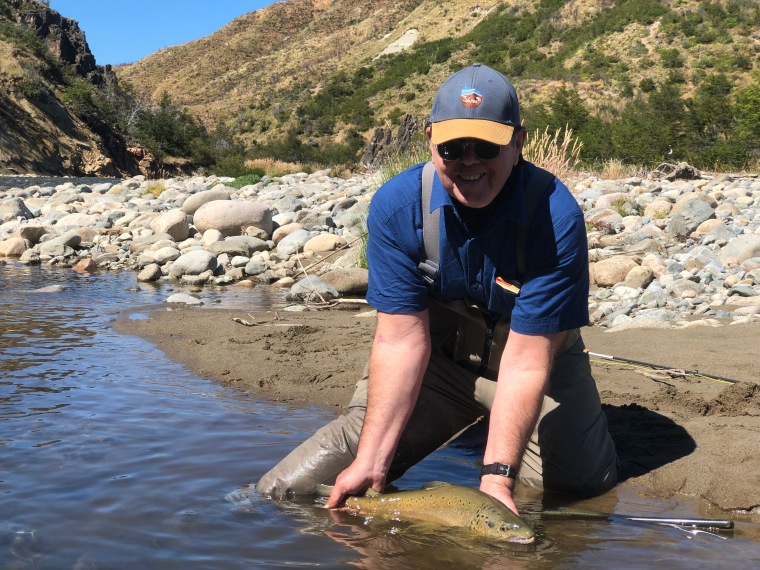
THE DALAI LAMA MAKES A SURPRISE APPEARANCE
Although it’s an outdoor thing, in which the unknowns of weather, water and wind are key, an organised fishing holiday is usually assembled around the knowable, earthly business of eating three times a day. Good company and conversation are part of it. The lodges vie to describe the excellence of their cuisine (very few talk about “cooking” or “food”) and wines. But the unspoken pitch here is people around a table telling stories and enjoying the company.
Breakfast is like settling down in the theatre before the curtain rises. There is a lot of snatched and impatient conversation because the audience wants the show to start. Lunch is an interlude for reflection with the guide on the drama witnessed, a pause in which to reassess and come to conclusions that only the resumption of the play will prove true or false.
Dinner is that moment when the show is over, the curtain has fallen, and the actors acknowledge the applause and either bask in their success or go through the motions and feel, secretly in most cases, the pain of failure.
The drama was good all week, one poor day notwithstanding. That was when Miguel took me up a small and low stream to sight fish with a tiny dry fly for rising trout. I just couldn’t manage to land the fly in the right place because it’s not a style of fishing I do very often. And my eyes are as old as me.
Such was Miguel’s commitment that he took every miss, every failed cast, personally, cursed all manner of donkeys and women at the top of his voice and generally made me feel like a bumbling 69-year-old novice, which I suppose I am in many ways.
But it’s not a day that stands out in my memories. There were two lakes on the map which offered monster fish and relatively lazy fishing from his inflatable boat. On both waters I made my acquaintance with the Dalai Lama, a black streamer sometimes called the Dolly Lama. It’s apparently a fly from Alaska but, like the Dalai Lama himself, worked an awful long way from home. And in all the time I was there I never saw another fisherman on the water.
On one lake I caught the biggest Brook Trout I have ever seen. Lots of them. They pounced out of the weeds to grab the Dalai Lama like herons snaffling fry. Each fish seemed bigger than the last and my biggest was more than five pounds. It came to the net like an innocent being dragged before a firing squad. It just never gave up on the injustice of it all. I was elated. Miguel was circumspect. “There are much bigger ones,” he said. I felt he was leaving something unspoken and let it rest there.
IN SEARCH OF MOBY BROWN
And there was a second lake which contained monster Brown and Rainbow Trout. As we rowed over the shallows in bright sunlight, I could see logs on the sand at the bottom, except that these logs had fins and moved. Miguel said there was one legendary Brown that he had seen in the shallows on our first visit.
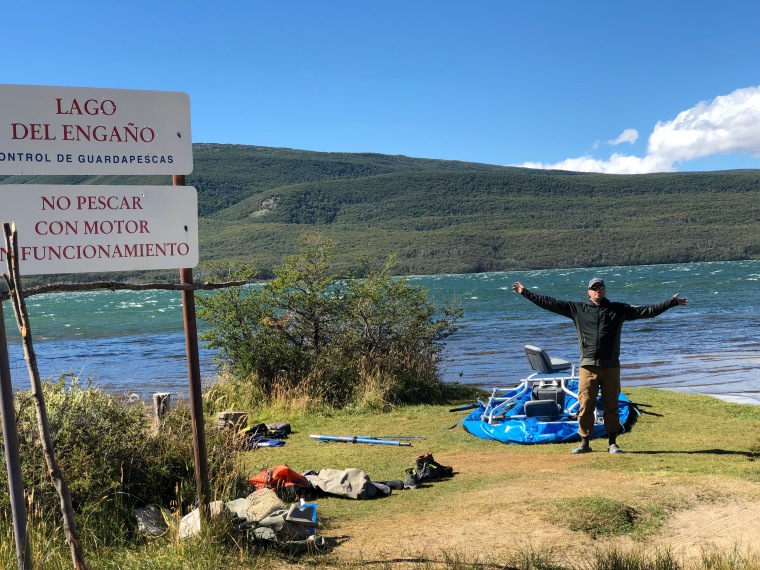
We called it Moby Trout. The first time I caught him he stripped line off my reel so fast that it became a blur in my hands. Then the handle of my reel caught in my jacket, the line went tight and then pinged back towards me. The Dalai Lama caught me in the chest. Miguel invoked several parts of the male anatomy, one or two deities, my mother and some farmyard animals before he calmed down.
We went back to hunt for it on my last day. A couple of “smaller” trout intervened – they were Rainbows and Browns weighing about five/six pounds, but our quarry was almost twice that size. We saw him jump once behind us and turned the boat round and edged towards the spot. I cast. I hooked it. It came out of the water like a missile and then ripped off line and backing as it headed for the reeds.
“Let it run, don’t try to stop it, let it run,” Miguel was yelling. “Keep the reel away from your jacket. Don’t touch anything, just let it go.” So I let it run and it headed for a stretch of bulrushes. “Let it go into the weeds, we can follow it,” yelled Miguel bending his back into the oars to head for the weeds and catch up with the runaway monster.
And then the line suddenly whipped back towards us both. Moby Trout was off, again. I reeled in my line apologetically, in silence. Miguel found some parts of the male anatomy that he had missed in his previous outburst. He also questioned my manhood and parental antecedents.
He leant across the boat to grab the fly. The Dalai Lama has a black body and trailing hook attached by a piece of wire. The hook was no longer there. Only half of the fly came back. The remainder was in Moby Trout’s jaws. The fly had simply snapped in half. Some kind of honour was restored. I felt reprieved. The firing squad had shot blanks. Ten minutes later I caught the biggest Rainbow Trout I have ever landed. Miguel rowed us to the shore so we could net it safely. Eight pounds? Ten pounds? I neither know nor care. I held it in the shallows until it regained its poise and with one contemptuous flick of its enormous tail, it was gone, leaving a metre of shimmering wake.
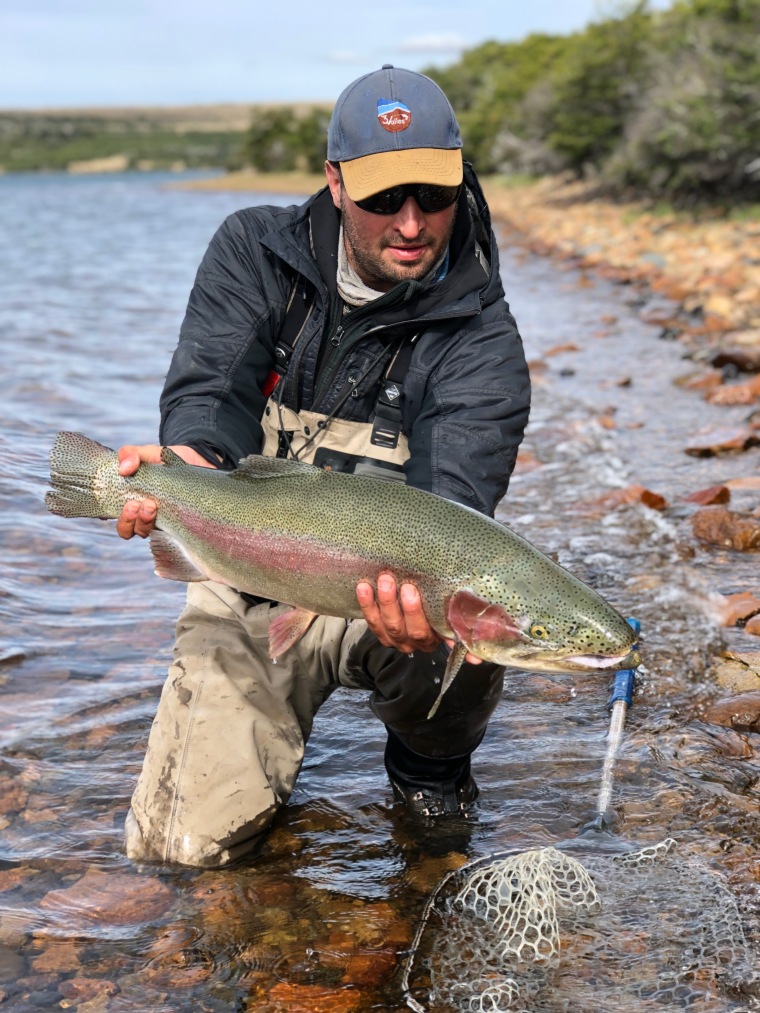
I called a halt to the fishing and Miguel rowed us across the lake to our car, where he disassembled the boat and packed our gear. I sat on a tussock looking out over the water, drinking hot coffee and smoking cigarettes. My whole body was tingling with a sense of well-being. I drank the moment as much as the coffee. In my consciousness there was not a single dark place, snag or regret where my mind could go. There was only the feeling of being enormously lucky, deeply content, and in awe of it all.
DID EINSTEIN FISH?
Months later I sat on a tussock in Essex, England, with my son Lewis. He had driven me from his home to show me all the greenery and nature that exists around the place where he and his girlfriend, Sam, have made home. It was a warm summer’s afternoon. We looked out over meadows and across forests to a distant town and said very little. Not much needed saying. He is proud at having chosen a home near London which can still boast trees and water. I am proud that these are choices he has made, but which reflect my choices too.
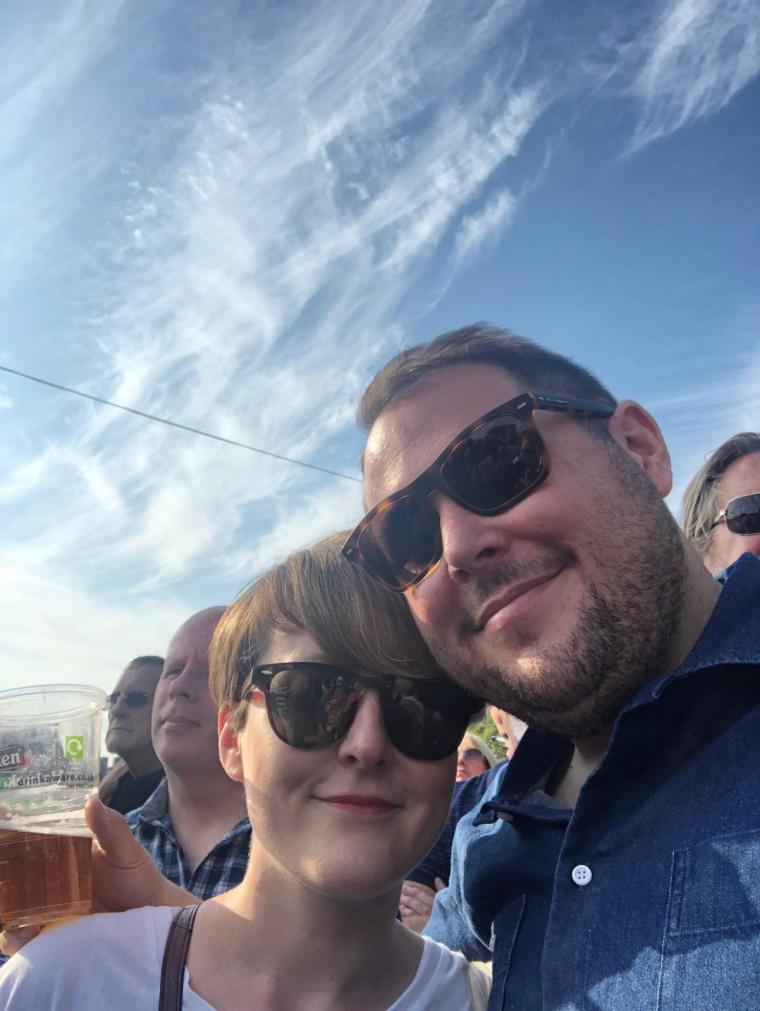
Before we parted, he gave me a novel to read, a Crime/Thriller that I’d missed, and promised it would keep me occupied while I flew back to Dubai. It did. It’s one helluva good read. Before the Fall, by Noah Hawley. But in it I came across some quotes by Albert Einstein, the father of relativity, and someone I had always thought might be a bit dull and scientific. Not a bit of it. I was wrong.
“What I see in Nature is a magnificent structure that we can comprehend only very imperfectly, and that must fill a thinking person with a feeling of humility. This is a genuinely religious feeling that has nothing to do with mysticism,” he wrote. I know I have feelings of that order when I fish, which is a key reason why I do it. I also checked out the Dalai Lama since he was so much a part of Tres Valles for me.
“We need to learn to want what we have, not to have what we want, in order to get stable and steady happiness,” he said. He also had some words which seem appropriate in this age of greed and waste. “Compassion is the radicalism of our time.”
Thank you: Tres Valles, the Dalai Lama, Albert Einstein, and my son.
AJH/Dubai/2019
ROD LENGTH ANXIETY CURED BY END OF WORLD BREAK
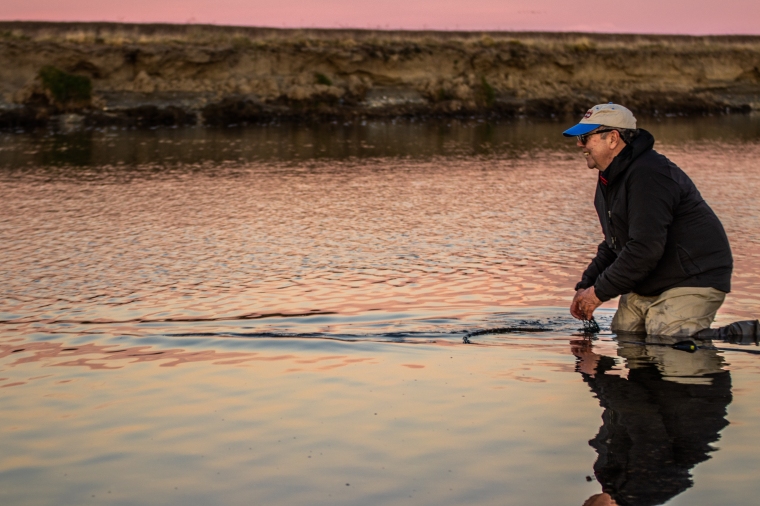 Rod length anxiety stalked me all the way from the Horn of Africa to the windy shores at the end of the world in Tierra del Fuego, Argentina. Somewhere between Hargeisa, Dubai, Buenos Aires and Ushuaia, I lost track of time completely. Was it Saturday or Sunday? But the anxiety over the length of my rod never left me in all those hours of recycled air, movies adapted for showing on airplanes and what would you like to have for breakfast Mr Hill? Breakfast? Didn’t we have that after our two-hour layover in Rio de Janeiro? Full disclosure here. After all, sharing is caring. Shame dies on exposure, etc. I had long planned to go fish for Sea Trout at the Kau Taupen lodge on the banks of the Rio Grande in January, when the fish are usually running upstream to spawn, and being caught. Sea Trout are my preferred quarry and the ones I am used to catching in Ireland weigh at best 4lbs using a slim and light rod that is about nine foot in length, weighs next to nothing and which I can cast with one hand.
Rod length anxiety stalked me all the way from the Horn of Africa to the windy shores at the end of the world in Tierra del Fuego, Argentina. Somewhere between Hargeisa, Dubai, Buenos Aires and Ushuaia, I lost track of time completely. Was it Saturday or Sunday? But the anxiety over the length of my rod never left me in all those hours of recycled air, movies adapted for showing on airplanes and what would you like to have for breakfast Mr Hill? Breakfast? Didn’t we have that after our two-hour layover in Rio de Janeiro? Full disclosure here. After all, sharing is caring. Shame dies on exposure, etc. I had long planned to go fish for Sea Trout at the Kau Taupen lodge on the banks of the Rio Grande in January, when the fish are usually running upstream to spawn, and being caught. Sea Trout are my preferred quarry and the ones I am used to catching in Ireland weigh at best 4lbs using a slim and light rod that is about nine foot in length, weighs next to nothing and which I can cast with one hand.
Continue reading “ROD LENGTH ANXIETY CURED BY END OF WORLD BREAK”
DROUGHT FISHING IN IRELAND
THE LONG AND WINDING ROAD


The long and winding road that led to my door started in a chilly pre-dawn ride from my work base in Hargeisa. I spend about half my working life there. Pictured is my favourite Cafe la Afrah, where government and development people sit inside with good food and coffee while their bodyguards and drivers enjoy the same outside.
It ended with a warm two a.m. drive from Dublin to Cork. There was one diversion, although you might call it a devotion, and that was to stop briefly by my home river, a 25-year-old ritual at every homecoming and home-leaving too. I parked the car at the bridge and tumbled out into the warm early morning air. Many things make that spot remarkable, not just a quarter century of memories. There is a special smell to that little vale, of farmland, a heady scent of things growing half the year and a woody odour of nature either withstanding the weather or rotting under it in the other half.
MAKES YOU THINK ALL THE WORLD’S A SUNNY DAY
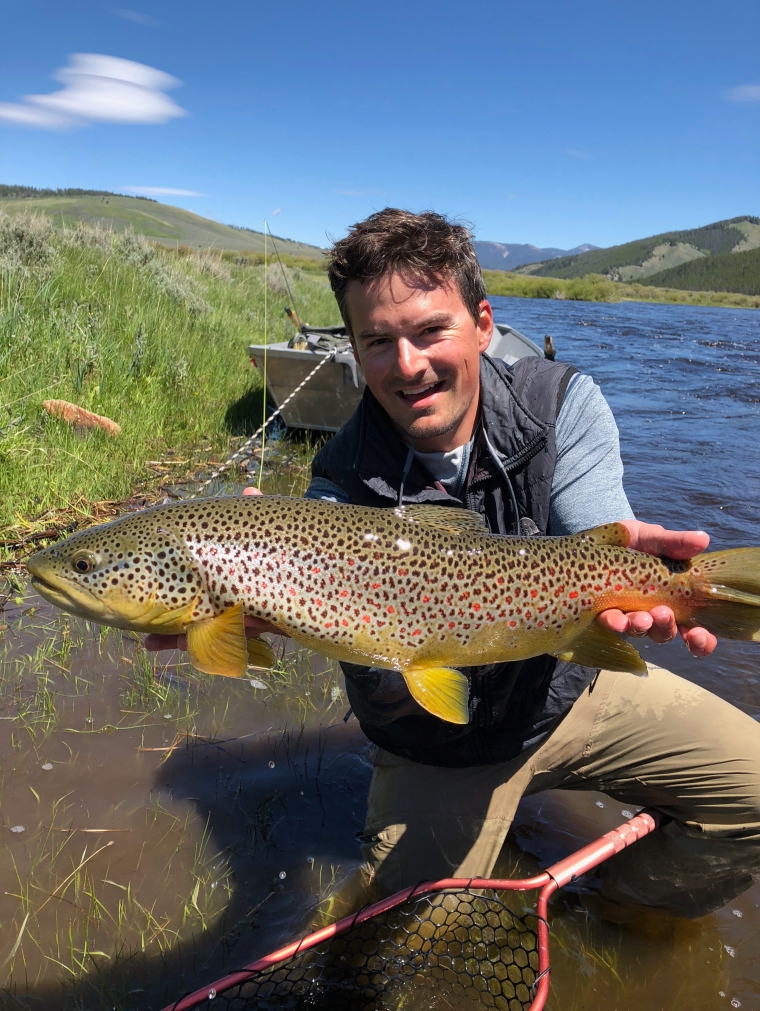
They’ve become as much a part of fly fishing as rods and reels. They are the photos that we take and keep, usually of hunter and quarry. Guides call them “hero shots.”
Continue reading “MAKES YOU THINK ALL THE WORLD’S A SUNNY DAY”
The Fishing Guide – diplomat, shrink and human fish-finder
You have to feel for the modern fishing guide. They’re the ones who aren’t wearing the latest Simms, Orvis and Patagonia at the launch site. Their clients are. They’re the ones who don’t strut around with rods in their hand talking about the amazing Peacock Bass in Brazil or the Taimen in Mongolia that took a lure the size of a duckling. Out of all the goretex-ed, felt-booted, baseball-capped, polaroided, khaki-clad people milling around the launch sites, the take-out ramps and the lunch spots, they’re the ones who don’t look like they’re trying to look like fishermen.
Continue reading “The Fishing Guide – diplomat, shrink and human fish-finder”
BIG SKY, BIG LAKE, BIG FISH AND BIG-HEARTED BERNARDO
As dusk fell the stars came out above us, the fire roared in front of us and the horses gathered around the blaze because the smoke kept the few insects that roamed the dusk at bay. Less tail swishing needed. Marcelo, my guide, stretched out in front of it all on a log with a beer, said: “Welcome to my office.”
Continue reading “BIG SKY, BIG LAKE, BIG FISH AND BIG-HEARTED BERNARDO”
SWAN’S WAY – IN SEARCH OF LOST TIME
I hadn’t fished for more than 200 days before arriving in Patagonia. So at first I was like a long-term prisoner being freed and dropped off in London with a bulging wallet. I cast wildly and too hard, struck at every fish as if it were a world record and was generally in such a rush that my guide, Marcelo, had to carry out a playground roster check on my tackle before we headed out every day. “Rod, reel, line, flies, sunglasses, glasses, sunshield, hat, waterproof jacket……” Continue reading “SWAN’S WAY – IN SEARCH OF LOST TIME”
LOVE, ATTRACTION AND CORN FLAKES
It wasn’t exactly love at first sight. But there was no mistaking that electric tingle of recognition when our eyes first met on the deck of the Estancia de los Rios lodge. Not unlike the charge I had received from an electrified sheep fence while fishing a river Cisnes tributary the day before. It was not enough to cause pain but just sufficient to shock me into a more elevated altitude of awareness. So we exchanged looks again. And the looks became stares. And in that exchange we communicated, wordlessly. My eyes signalled attraction. Her eyes said transaction. In that moment we had situated ourselves quite clearly on both sides of an emotional divide. I now knew my place. My feelings of needing to care on one side, hard-headed material needs on the other. Attraction versus transaction. I had been here before in recent years, painfully so.
So I offered her corn flakes on the patio, a warm gesture I thought, perhaps an opening. She walked over, examined my offering, and swept them out into the breeze with something like contempt. Birds of prey don’t eat breakfast cereals. They prefer things with blood.

And this young Southern Caracara knew what she wanted and how to get it. By turning up regularly on the deck, she had been fed by Victoria, and now she expected it daily. She strutted up and down the railing going round the deck almost every morning and evening, awaiting room service from the Manager’s wife. Breakfast time was a good moment to admire her good looks her sledgehammer beak, grappling iron talons and slightly ridiculous pantaloon leg feathers. I have history with these big, predatory birds. On an island in the Falklands (Malvinas) chain, one took a shine to me and followed me everywhere I went by foot or by land rover. I was touched and amused, until it swooped down one day and made off with my shiny new cigarette lighter. The bird guides say they are “very social creatures” but should add that they are also light-fingered. Or should that be light-taloned?

By day three I had settled into the lodge’s easy rhythms of eat, fish, sleep. It can be cold and gusty in the mornings so the lodge doesn’t advise going out to fish until 10.00 a.m. No crunching the hoar frost or shivering bankside to catch the “early rise,” a myth that persists in fly fishing in the northern hemisphere. At the Estancia de los Rios, breakfast is taken at a leisurely 0830 – fruit, cereal, yoghurt , scrambled eggs, bacon, fresh orange juice. This is the moment to decide what sort of fishing the weather will allow – the fish are more active on sunny days but will still come up when it’s Scottish-style dreek, but the wind dictates whether you fish a lake., float the river or try an enclosed spring creek.
Enter Marcelo the guide at 0945, a Don Quixote tee shirt showing under his Simms waders. He is tilting windmills of time with an Orvis Superfine rod. The wind is picking up and we are going to try some spring creeks and backwaters. They tend to hold the biggest fish outside of the lake systems and I am keen to see them. My guide and I have settled easily into the rhythms of companionship; there is an equipment check before we set out – rod, reels, rain jacket, hat, sunglasses. I have bought a box of flies from Marcelo the host. It contains garish beetle imitations, big enough for hungry fish and ageing anglers to see. They are made out of foam and strips of rubber for legs. The black and pink one is so My Little Pony unreal that I have secretly dubbed it the Black Barbie. Marcelo fires up a 70s playlist on his in-car phone audio system, and we head off into the hills for a day’s reflective, soothing and healing fly fishing singing along to Abba’s Dancing queen and Blondie’s Heart of Glass. You couldn’t make it up.
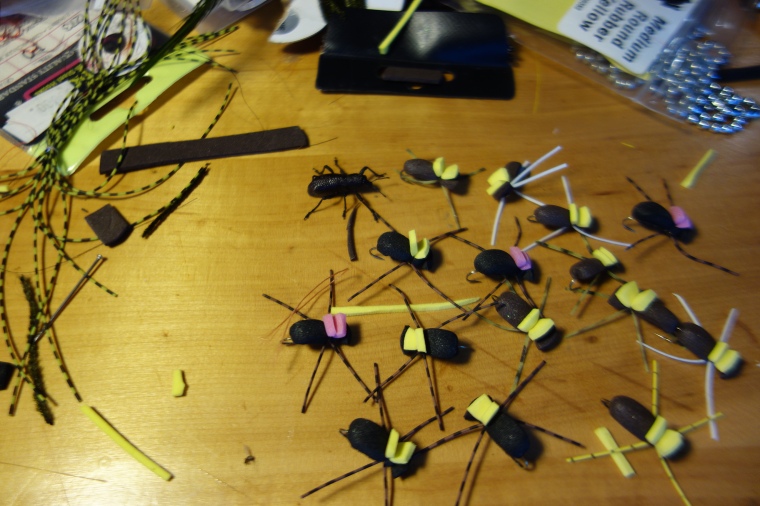
The first spring creek is the size of an irrigation ditch and I cannot land a fly anywhere except in the grass beside it or trees over it. Fish rise in this water nonetheless. They do everywhere, in little drainage runoffs and puddles cut off from the main river. Each morning we drive across the river on our journeying. The water is hardly as high as the hub caps, but you can see trout rising, even in this. We head off to another set of pools which I think Marcelo has dubbed the “Strange beat” because the pools seem unconnected, but they are by an invisible underground source. We tread carefully up to the tree-lined bank to avoid disturbing the fish and crouch like dogs winding up to ambush a cat. The creek is deep and weedy and about as wide as one lane of European country road. I can see a fish the size of my forearm cruising around like a lurking U-boat in a World War Two film.
We back out carefully to inspect my tackle. The wind is so strong in Patagonia that it is advisable to rig rods with a line that is one weight heavier than the rod is meant to cast. It’s the equivalent of putting on really big car tyres to deal with hostile terrain. The heavier line gives you more control in anything but the tearaway gusts that materialise out of a steady wind with such force that you become, for one tantalising moment, weightless as you lean forward to reaffirm your centre of gravity. We check my line and the Black Barbie and move back, marine-style to the water’s edge. The fish is no longer where we saw it, which is a relief to me because I am not sure I can land the fly close to it in the wind now blowing. So I cast the fly close to the opposite bank and wait for the trout to cruise by. I cannot see it, even with my polarised prescription glasses, but Marcelo has a Caracara’s vision. When he sees it in the general area of my fly, he hisses out: “Twitch. Twitch. Twitch.” And I jerk the fly a little to create water surface disturbance and get the fish’s attention. The next moment the fish twists upwards and hurls itself at my fly; I have no need of Marcelo’s “Set, Set, Set, ” because I have instinctively struck the rod to set the hook in the fish’s jaw, and we are now locked together in a struggle for supremacy. Three or four minutes later Marcelo’s net slipping under the fish declares me the winner. He carefully extracts a somewhat battered Black Barbie from the fish. It is a big, big fish, far bigger than anything I have encountered on the previous two days, perhaps 18 inches long and built like a cannon shell – a golden brassy hue on its flanks, a sharply pointed mouth where black spots glisten, and a broad and powerful tail. I am breathless with wonder, utterly anchored to this moment and the birdsong, the rush of wind and Marcelo’s urging that we take a picture and put it back in the water it came from. I look at Marcelo’s face and see quite clearly that the Guide is just as happy as the disciple in this shared journey of enlightenment.
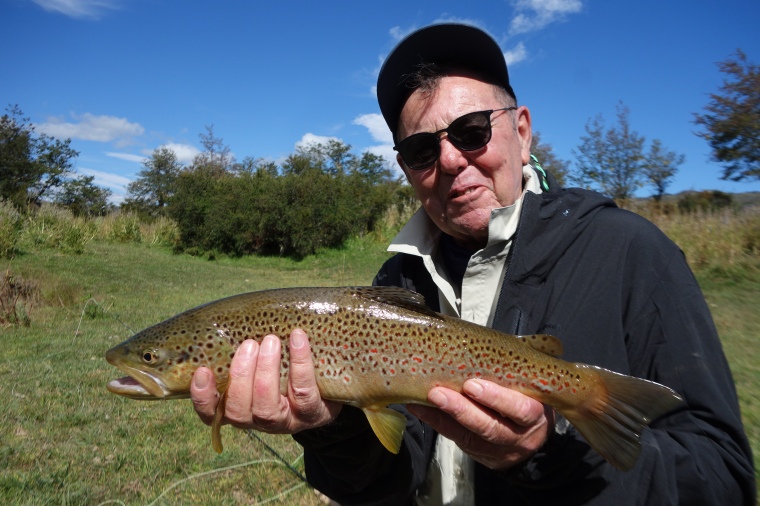
Many more fish follow from that same little stretch of water between scraggy groves of greenery . They all have a magical hue of brass or gold, an appropriate burnish for the precious things that they are. To me and to my guide. We take one more brutishly resistant specimen at the final pool and it is well beyond time to sit down and reconnect with the rest of the world with lunchtime conversation in the grass and to let the adrenalin work itself out of the system.
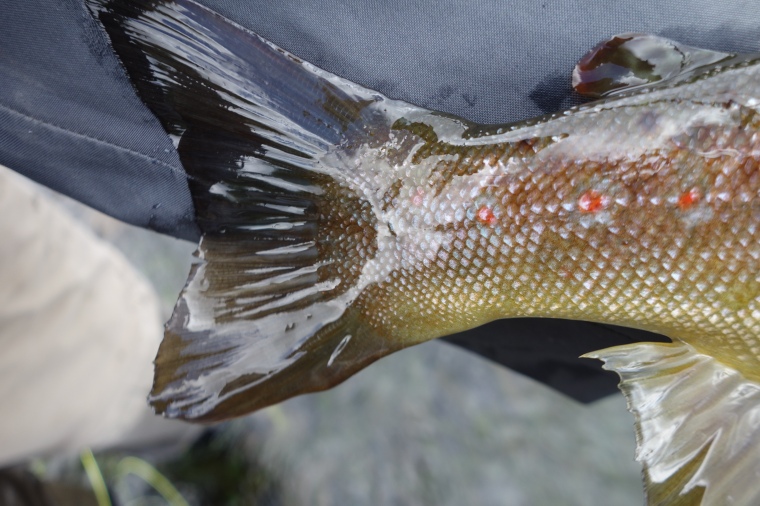
There is a break in the routine of the past two days. No extravagant wholemeal sandwich in greaseproof paper today. Marcelo goes to the truck and pulls pieces of metal out of an old Washington state apple box bearing the farm’s name. Trout, it says in big letters. The metal work is a barbecue grill which he screws to two legs and then places over a fire started with twigs, olive oil and dried leaves. It is soon blazing determinedly with sticks and branches collected under the trees. When the flames die down, Marcelo throws three steaks on the grill, seasoning each with salt. Would someone kindly tell Burger King that they haven’t the faintest idea of what “flame-grilled” smells or tastes like? We eat the steaks, a quinoa salad and, as if that were not enough, snack on mixed nuts, olive, salami and tiny hot rolls and butter.
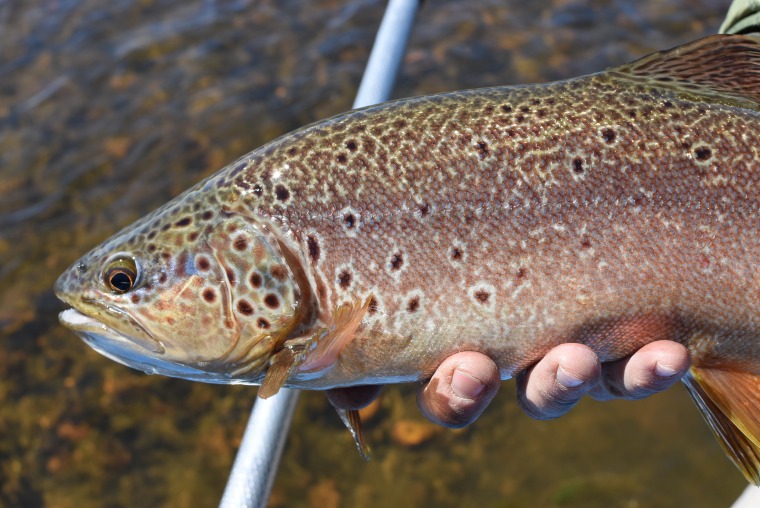
.Marcelo has also pulled two folding chairs out of the truck, so we sit there under the sun and the wind, eating like kings, feeling like princes of Patagonia, revelling in our kingdom. To round it off Marcelo brews fresh coffee in a travelling French press. There is silence, apart for some birdsong and the wind, as we drink from tin cups and consume chocolate chip cookies made by the lodge’s amiable chef, Christian. There is no need to talk. On the wind I can smell the wild chamomile , wild mint and wood smoke.
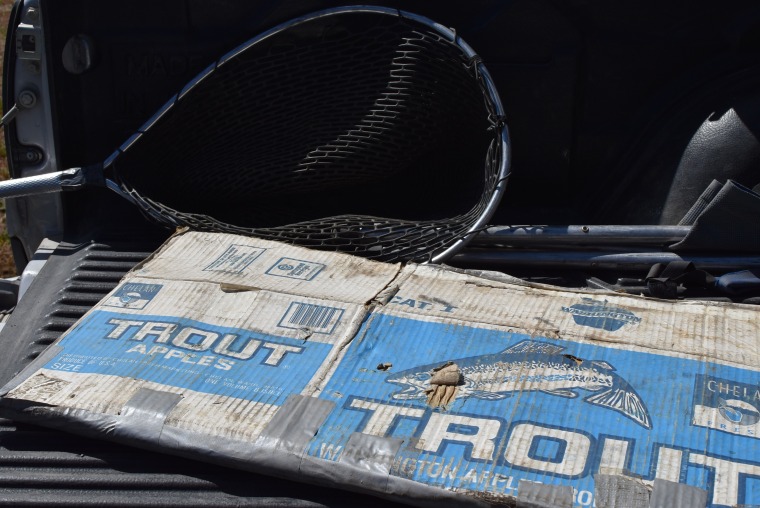
I know of few experiences in which the moment is all you live in, and fishing is my number one. The unwanted guests of painful memory or anxieties about the future just don’t intrude. All there is, is now. And now, on the Patagonian plains, is where we are.
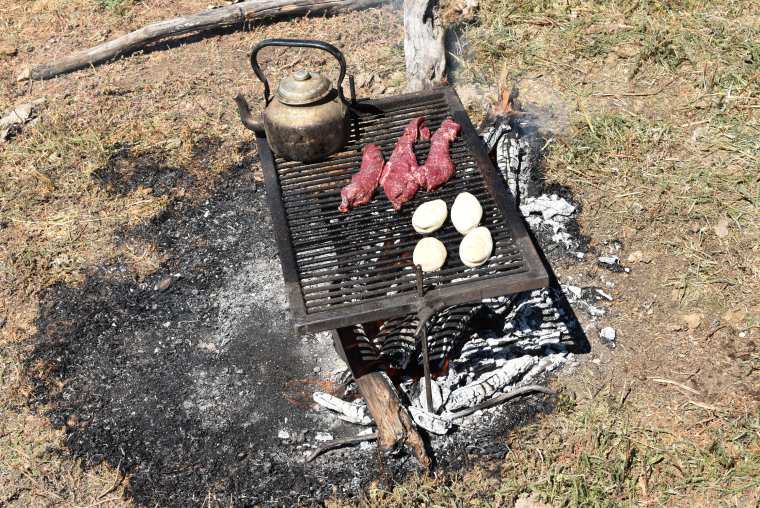
Christian has dinner ready for guests around eight thirty, allowing plenty of time to fish into the evening, come back, shower and still have a fireside drink before more good food. There is no pressure to come back at any specific time. This is an experience conceived by people who fish for people who fish. It renders the lunch break even more relaxing.
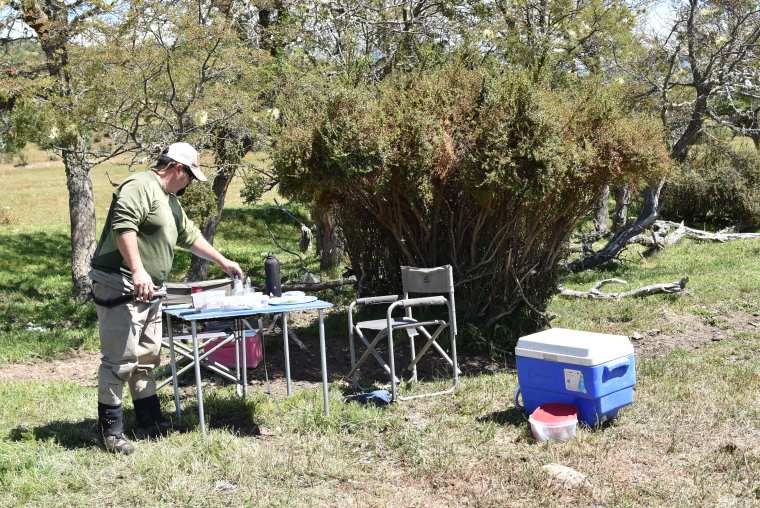
We do fish some more that afternoon in another creek but the water has been churned up by thirsty cattle. We see a couple of big fish but Barbie holds no magic for them. I am, anyway, happy to call it a day by five in the afternoon. We head home in the truck. The Spotify selection has switched to the 1950s and Neil Sedaka, Marcelo and I are singing “Oh Carol, I am but a fool, darling I love you, thought you treat me cru-el.” I was born in the 1950s so how Marcelo knows the lyrics requires explanation. “I heard it, and it was the first song I ever learned in English,” he explains. He is 21 years younger than me but bouncing back home in the truck, unhooking complicated gaucho gates made out of a stick and two pieces of wire, the age difference doesn’t seem to matter. We are both living in the moment. Happily.
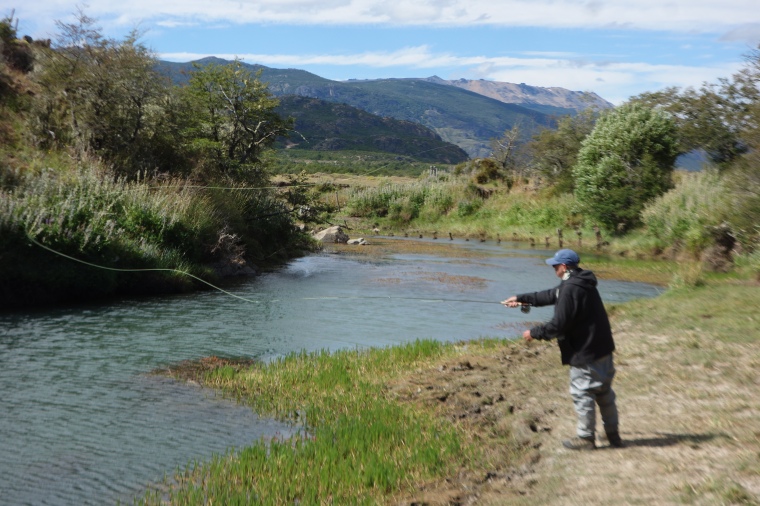
I begin to detect a routine in the way we get back to the lodge. When we are close and at any kind of neight, Marcelo radios ahead. “Casa verde, casa verde, ola.” A reply comes back which I cannot understand; but then all the Spanish I know I learned from Clint Eastwood in the Good, the Bad and the Ugly film series. Marcelo then says, “Un café y un cervesa po fav,” and the lodge acknowledges the message. As we cross the shallow river at the entrance to the lodge, Marcelo radios through again. “Casa Verde, Casa Verde, Rio, Rio.” And then we come to the little wooden bridge over the Winchester creek that flows down from the mountains, where I will fish later in the week. “Casa verde, Casa verde, Puente Puente,” Marcelo s radios to the lodge.
When we get back to the mud room to haul off our boots, waders and several layers of clothing, there is, magically, Christian standing over a tiny cafetiere of coffee, a cold can of beer and humus made from broad beans served on home-made wholewheat crackers. I realise in a flash that it has all been rehearsed to perfection. Rio means river, Puente means bridge. Cervesa is Marcelo’s beer. This is how the welcome back hospitality is timed. Daily. . Shorn of my fishing gear, I walk out onto the veranda and see that there is some sort of commotion on the deck, where Victoria is standing in front of the young Caracara and gesticulating towards the roof or the sky. I carefully get closer to establish what this is all about. Surely not a lesson on the forthcoming full moon for a predatory bird?
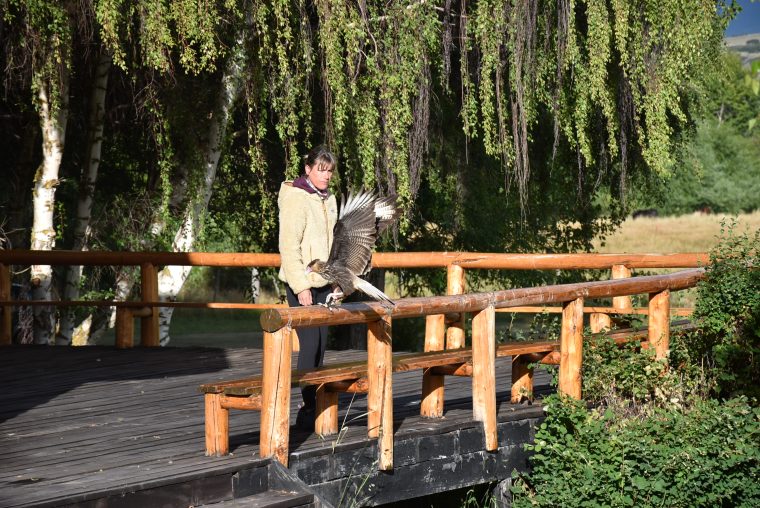
And then I get it. The mother of the young Caracara is on the roof with a tiny trout in its beak. It’s the length of my index finger. I’ve seen dozens of them scudding around the shallows of most waters I have come across here. You don’t have to speak Caracara to understand what is going on. Mother bird is telling adolescent bird “you don’t have to eat the rubbish these two-legged things give you. There’s masses of tasty trout in the water.”And the young Caracara is looking first at Victoria, then at its mother, and staying put. It’s hard to explain to any adolescent that the easy way out is often the worst but, hey, I survived my adolescence and so did my parents, just. The mother gives up in disgust and swoops off in the general direction of Argentina. So Victoria reappears with a piece of fish or meat in her hands and drapes it over the railings. The youngster grabs the offering and leaps backwards onto the grass to eat safely under a tree. At least its fear radar is working.
It’s a lovely moment. The generation gap as demonstrated by birdlife. A memory comes skittering out of a recess somewhere and makes me smile. It is a magnet my sister has affixed to her Dubai fridge after raising two boys through their complicated teens. It says, quite simply. “Because I’m your mother. That’s why.” The problem here is will the youngster follow her mum, or her sugar-mummy? Will it be love or a transaction?

